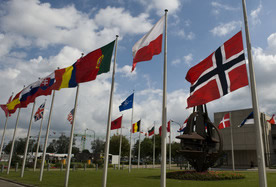 Earlier this week, NATO’s Secretary General, Anders Fogh Rasmussen, warned that European countries’ cuts in defense budgets risk the “gradual decline” of Europe. NATO’s engagement in Libya has exposed weaknesses in the alliance, particularly regarding who contributes to operations and how much. As Europe leaps to implement austerity measures, defense budgets are the first on the chopping block, leaving national governments with limited resources to participate in military operations.
Earlier this week, NATO’s Secretary General, Anders Fogh Rasmussen, warned that European countries’ cuts in defense budgets risk the “gradual decline” of Europe. NATO’s engagement in Libya has exposed weaknesses in the alliance, particularly regarding who contributes to operations and how much. As Europe leaps to implement austerity measures, defense budgets are the first on the chopping block, leaving national governments with limited resources to participate in military operations.
Operation Unified Protector, NATO’s mission in Libya met its initial objectives of grounding Libyan strongman Muammar Gaddafi’s air force and hindering its capabilities to harm civilians, but it has highlighted the alliance’s most exposed weaknesses. As former US Secretary of Defense Robert Gates pointed out in his speech in Brussels, “While every member of the alliance voted for [the] Libya mission, less than half have participated at all, and fewer than a third have been willing to participate in the strike mission.” Secretary Gates laments, NATO turning into a two-tiered alliance, and as witnessed in Afghanistan there is a distinct division between those allies who sacrifice blood and treasure in combat operations and those who sit and watch.
In his comments to BBC Radio 4, Rasmussen acknowledges that while Operation Unified Protector is a European led operation, it could not be carried out without the support of the United States. Both Rasmussen and Gates emphasize that much of this is owed to drastic defense cuts taken by European allies. As it currently stands only the United States, United Kingdom, France, Albania and Greece spend the 2 percent of GDP benchmark on defense.
European defense cuts have clearly weakened Europe’s security infrastructure. However, as Secretary Gates decries Europe’s military downgrade, the US must be careful not to follow its European friends to the precipice of military decline. Currently, United States plans to cut billions in military spending. Proposed cuts according to James Carafano, Ph.D. and Jim Phillips at the Heritage Foundation, include stealth aircraft, carrier battle groups, and amphibious capabilities—precisely the assets that made conducting the mission in Libya possible. The US message to Europe must not be one of “do as I say, not as I do.” The US must not scold Europeans for their inadequacies and then follow in the same lemming-like pattern.
The United States was a reluctant leader at the beginning of the NATO mission to Libya, and many resent NATO’s European allies for their lack of leadership and commitment. These have always been challenges of the alliance. However, in the midst of a poor economic environment and the operation in Libya, these challenges are exposed and prove worrying for international security. There are few alliances that can boast NATO’s record of success and it is the key mechanism that binds transatlantic security. However, in order for this alliance to work, members must commit the resources to seeing its future success.